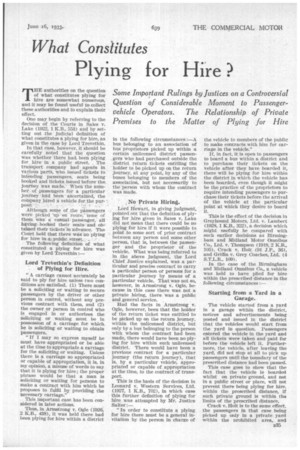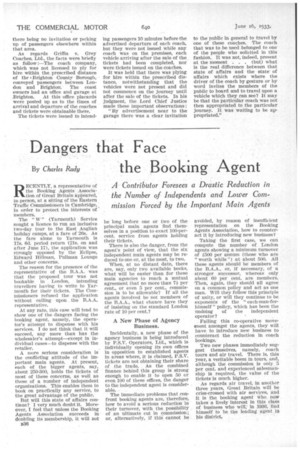What ConsMutes
Page 53

Page 54

If you've noticed an error in this article please click here to report it so we can fix it.
Plying for Hire ?
THE authorities on the question of what constitutes plying for hire are somewhat numerous, and it may be found useful to collect these authorities and to explain their effect.
One may begin by referring to the decision of the Courts in Sales v. Lake (1922, 1 KB., 553) and by setting out the judicial definition of what constitutes a plying for hire, as given in the case by Lord Trevethin.
In that case, however, it should be carefully noted that the question was whether there had. been plying for hirein a public street. The transport company had agents in various parts, who issued 'tickets to intending passengers, seats being hooked and tickets issued before the. journey was made:When the number of passengers for a particular journey had been -akertained, the company .hired a vehicle for.the pur
pose: • -, . ,.... , _ -, -...
Although some of the passengers were picked 'up en route, none of them. .wasa casual passenger,. all having ,..booked their seats and oh-,-tattled their tickets in -advance. The Court held that there Wiig 'no plying for hire in.a.,:. public. street. .... • • The following definition of what constituted a plying for hire was given by Lord Trevethin :— Lord TreVethin's Definition ._ of Plying for Hire.
"A. carriage cannot accurately be said to ply for hire unless two conditions are satisfied. (1) There must be a soliciting or waiting to secure passengers by the driver or other person in control, without any previous contract with them, and (2) the owner or person in control who is engaged in or authorizes the soliciting or waiting must be in possession of a carriage for which he is soliciting or waiting to obtain passengers.
"If I may so express myself he must have appropriated or be able at the time to appropriate a carriage for the soliciting or waiting. Unless there is a carriage so appropriated or capable of appropriation, it is, in my opinion, a misuse of words to say that it is plying for hire ; the proper phrase would be that a man is soliciting or waiting for persons to make a contract with him which he proposes to fulfil by providing the necessary carriage."
This important case has been con sidered in later actions. . Thus, in Armstrong v. Ogle (1926, 2 K.B., 438), it was held there had been plying for hire within a district in the following circumstances :—A bus belonging to an association of bus proprietors picked up within a certain .unlicensed district passengers who had purchased outside the district return tickets entitling the holder to be picked up on the return journey, at any point, by any of the buses belonging to members of the association, but not necessarily to the person with whom the contract was made.
No Private Hiring.
, Lord Hewart, in giving judgment, pointed out that the definition of plying for hire given in Sales v. Lake did not mean that there could be no plying for hire if it were possible to point to some sort of prior contract between any person and some other person, that is, between the passenger and the proprietor of the vehicle. What was being referred to in the above judgment, the Lord Chief Justice explained, was a particular and precise contract to carry a particular person or persons for a particular journey by means of a particular vehicle. That was not so, however, in Armstrong v. Ogle, because in this case there was not private hiring, there was a public and general service.
Had the facts in Armstrong v. Ogle, however, been that the holder of the return ticket was entitled to be picked up on the return journey, within the unlicensed district, but only by a bus belonging to the person with whom the contract had been made, there would have been no plying for hire within such unlicensed district. There would have been a previous contract for a particular journey (the return journey), that is, by a particular vehicle, appropriated or capable of appropriation at the time, to the contract of transport.
This is the basis of the decision in Leonard v. Western Services, Ltd. (1927, 1 K.B., 702), in which case this further definition of plying for hire was attempted by Mr. Justice Salter :— " In order to constitute a plying for hire there must be a general invitation by. the person in charge of the vehicle to members of the public to make contracts with him for carriage in the vehicle."
If, in fact, it is open to passengers to board a bus within a district and to purchase their tickets on the vehicle after they have boarded it, there will be plying for hire within the district in which the vehicle has been boarded, even though it might be the practice of the proprietors to require intending passengers to purchase their tickets before the arrival of the vehicle at the particular point at which they desire to board it.
This is the effect of the decision in Greyhound Motors, Ltd. v. Lambert (1928, 1 KB., 322), a decision which might usefully be compared with such earlier decisions as Birmingham and Midland Motor Omnibus Co., Ltd. v. Thompson (1918, 2 K.B., 305), Crack v. Holt (91 J.P., 34), and Griffin v. Grey Coaches, Ltd. (4 S.T.L.R., 109).
In the case of the Birmingham and Midland Omnibus Co., a vehicle was held to have plied for hire within the prescribed distance in the following circumstances :
Starting from a Yard in a Garage.
The vehicle started from a yard in a garage withiu the district, notices and advertisements being posted and issued in the district that the Vehicles would start from the yard in question. Passengers entered the vehicle in the yard and all tickets were taken and paid for before the vehicle left it. Furthermore, the vehicle, after leaving the yard, did not stop at all to pick up passengers until the boundary of the prescribed distance had been passed.
This case goes to show that the fact that the vehicle is boarded whilst on private ground, and not in a public street or place, will not prevent there being plying for hire, within the prescribed distance, if such private ground is within tho limits of the prescribed distance.
Crack v. Holt is to the same effect, the passengers in that case being picked up only in a private yard within the prohibited area, and there being no invitation or picking up of passengers elsewhere within that area.
As regards Griffin v. Grey Coaches, Ltd., the facts were briefly as follow coach company, which was not licensed to ply for hire within the prescribed distance of the 1Brighton County Borough, conveyed passengers between London and Brighton. The coast owners had an office and garage at Brighton. At this office placards were posted up as to the times of arrival and departure of the coaches and tickets were obtainable there,
The tickets were issued to intend
ing passengers 10 minutes before the advertised departure of each coach, but they were not issued while any coach was on the premises, each vehicle arriving after the sale of the tickets had been completed, nor were tickets issued on the coaches.
It was held that there was plying for hire within the prescribed distance, notwithstanding that the vehicles were not present and did not commence on the journey until after the sale of the tickets. In his judgment, the Lord Chief Justice made these important observations : "By advertisement near to the garage there was a clear invitation to the public in general to travel by one of these coaches. The coach that was to be used belonged to one of the people who solicited in this fashion. It was not, indeed, present at the moment . . . (but) what is the real difference between that state of affairs and the state of affairs which exists where the driver of the coach by gesture or by word invites the members of the public to board and to travel upon a vehicle which they can see? It may be that the particular coach was not then appropriated to the particular journey. It was waiting to be appropriated."






































































































